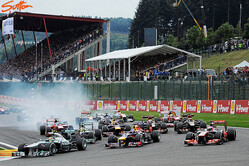


03/10/2013
NEWS STORY
 Mat Coch writes:
Mat Coch writes:
An ever growing calendar holds no fears for the well drilled staff at McLaren, says the team's Sporting Director, Sam Michael.
The draft 2014 calendar released by the World Motor Sport Council last month included no less than twenty-two grands prix making it the busiest season in the championship's history. Korea, New Jersey and Mexico were all marked provisional, and two of the three are expected to fall by the wayside in the final version, but even in draft form Michael seems unconcerned at the challenge presented.
"Formula One is all about change, and change management," he said. "I've been through plenty of examples previously in my Formula One career where I thought there's no way they can do that and they do, and you just adapt.
"Formula One is about achieving things that aren't normally possible," he added, "and this is far from the worst challenge we've had, if I can put it like that."
Starting at its now traditional opening in Australia the proposed calendar has no fewer than five back-to-back races, not to mention a unique triple-header which would see teams pitch tent in Monaco, New Jersey and Montreal on consecutive weekends.
"Obviously if we can do a double-header you can do a triple-header in terms of logistics and moving freight," Michael explained. "Equipment wise you can be covered as long as you've got enough sets to leapfrog each other."
Freight however isn't the main problem, the long gruelling season filled with airports, hire cars and hotels is expected to take its toll on personnel more than trucks and airplanes.
"You have to perhaps consider the support crew that has come and set up for the grand prix, perhaps they won't always be the same people," Michael reasoned. "You may eventually get to the point where you have separate crews that actually crew the cars or even engineer the cars, I'm not sure we're quite at that point."
Cost however is not a factor in the teams' current decision making process; more races mean more income, and the larger teams can likely cover the additional requirements without the need to hire in new staff. "We have an operations group that runs heritage cars and obviously builds test cars and things like that anyway," said Michael, suggesting his team, for one, could already cope with the additional load.
Others seem less certain. In Singapore Lotus boss Eric Boullier explained that an additional ten grands prix would be simpler for teams than another three or four. More races give the team a clear need for additional staff, where a small increase blurs the line in terms of how thin they can spread their current workforce.
Serious question marks however hang over both the New Jersey and Korean grands prix, the 22-race provisional calendar expected to decrease to just twenty races, a thought reinforced by Michael's boss Martin Whitmarsh in Singapore.
"I probably shouldn't say it but I suspect there won't be 22 races next year," Whitmarsh responded when asked about the difficulty of an expanded calendar. "I think Bernie does a very good job at beating up to get enough promoters and I think there's usually a few casualties so I suspect there will be less than 22 races."
Even still, Michael seems unconcerned. "We'll just need to adapt if that's what's required," he affirmed. "I'm not concerned. It's a matter of Formula One adjusting and adapting to whatever the business needs are."